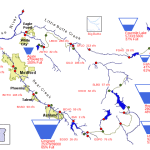Don’t Uproot Ashland Goes to Ashland City Council about the Hog/Chicken Slaughter Farm
Below is the statement to the council made by Dr. Denise Krause. This is an excellent summary of the issues.
Dear Members of the Council:
My name is Dr. Denise Krause from Ashland. I am a retired professor of public health and epidemiology.
The owners of 3152 Siskiyou Blvd and the new business, Uproot Ashland, or Uproot Meats, have applied for a permit with Jackson County to operate a poultry/hog feeding operation and slaughterhouse in the most unlikely of places — on the upper side of a steep, formerly wooded hillside right on the edge of the City of Ashland above Weisinger’s Winery. This is the same property where the same owners did extensive excavation to put in a marijuana grow operation before getting permitted and without water rights, visible from I-5, Siskiyou Blvd, and Tolman Creek Rd. The surrounding properties (all downhill) are homes, farms, wineries, and public and private water sources. Animal feeding and processing facilities are well known to adversely affect water quality and air quality and to introduce numerous public health risks, while producing excessive methane gases contributing to climate change.
We are not opposed to the concept of a small family farm and many of us are even attracted to the idea of a meat CSA, if responsibly raised. This proposal, however, is not for a small farm. This land use permit is to expand this small-scale farm into a medium-sized confined animal feeding operation and slaughterhouse with 20,000 chickens per year (mostly in a very confined space) and 40-50 hogs at a time, feeding and excreting on a steep, eroding, barren slope on the edge of town.
Location, location, location. According to the national hog farmer profession, the most important factor for success for this type of operation is proper site selection. “Good site selection should consider surrounding topography. Relatively level terrain, no obstacles, and areas with moderate to high wind velocity promote good odor dispersion. Confined valleys where sensitive sites are downslope of the facility are much more vulnerable.” The location of this operation meets none of these criteria. It is situated on a steep slope in a neighborhood, thus endangering soil, water, and air in the surrounding area. This property does not have pastureland where animals should be rotated on a regular basis. On the contrary, it is on a denuded, eroding, unstable, porous hillside with an irrigation canal, multiple residential wells, natural springs, and Tolman Creek just below. Many of the trees that might have helped with erosion control have been eliminated by fire or excavation as can be witnessed from any direction. The Rogue Valley is a confined valley known to be subject to inversions. The proposed site is upslope of all other properties, putting all those below at considerable risk from environmental pollution.
Water Quality. The hog lot sits on a steep slope just above the TID irrigation canal, which serves several communities and serves as a drinking water source for Ashland. TID management officials have stated their concerns due to the proximity to the canal. Moreover, the property owners do not have an industrial septic system to handle the waste. Runoff could threaten the TID and all these other water sources. Incidentally, the property itself does not have TID irrigation access rights, yet it threatens that water source for so many others.
Air quality. Odor from pig farms has long been a contentious issue and can have a dramatic impact on health-related quality of life. Rising concerns about how emissions from livestock operations
might be affecting nearby communities have led to a number of lawsuits in recent years. Farmers have been charged with violations of the Clean Air Act and Right to Know laws. In Oregon, state law stipulates that “new confined animal feeding operations should not be located where prevailing winds are likely to carry odors into residential or recreational areas.”
Food Safety. We have seen recently in the news what happens when irrigation water contaminated by manure is used on crops — numerous reports of severe illnesses, hospitalizations, and even deaths. The federal administration has weakened food safety standards and oversight specifically for chicken and pork slaughterhouses, making it harder for inspectors to review each carcass and increasing the risk of disease outbreaks. Industrial-scale livestock operations have also become a ticking time bomb for antibiotic-resistant superbugs, contributing to a public health crisis in America.
We understand that they have a Right to Farm. We also understand that we all have a right to clean water, clean air, and safe food.
Jackson County’s decision “to approve is subject to thirteen conditions:” The TID submitted a letter of concern to the Jackson County Planning Department about erosion and potential contamination of the canal that serves so many. The DEQ has a number of concerns about contamination of surface and ground water contributed to inadequate waste management practices. The fire district is concerned with access to the property, the slope, and the limitations of the bridge to support a 50,000 lb. fire truck. The airport has its list of requirements. The concerns of these groups, and several others, have not yet been addressed, but are largely represented in the thirteen conditions. These conditions must still be adequately addressed and some may not even be possible to mitigate. It is important to note that some of the organizations who received notice are not represented in the conditions for approval, such as the City of Ashland and the Department of Agriculture. Other agencies were not even included in the notice, such as OSHA.
I, along with many other Ashland residents, strongly believe that the proposed operation in the proposed location raises serious public health and environmental concerns and would lead to an overall diminished quality of life for people in the area, while also having a negative impact on property values. It would be detrimental to neighboring residences and businesses, growers who supply food to the community and raise animals, backyard gardeners, and those who consume local food in surrounding communities, or drink the water in Ashland. The Rogue Valley is prone to inversion. Adding to water and air pollution, as well as the production of methane gases, is the last thing Ashland needs to allow to happen in its backyard. At this point in history, when we are in the midst of a climate change crisis, this is time to be part of the solution, not the problem. Ashlanders need to know that you’ve got their back.
Thank you for your time and attention. Denise Krause, Ph.D. Don’t Uproot Ashland! Committee





